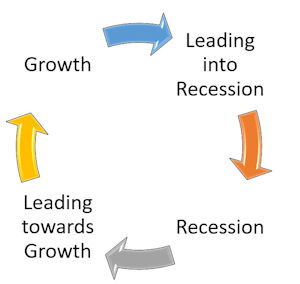This is my forth recession since starting HMS Software. I’m not liking this one any better than I liked the first three. We started HMS in 1984 just after the 1981-82 recession that was driven by middle east oil prices. It was a period of great growth that was accompanied by a huge expansion of technology. In 1990 we’d been in business for a few years already and inflation issues jumped in to cause a second recession. Interest rates were high and that made many projects hard to start. In the early 2000’s we had the “Great Recession” that was based on the subprime mortgage crises and precipitated the financial crisis. And now, the Covid-19 recession is underway.
I’m often asked by colleagues whose businesses are younger than ours or our own staff whether the economic phases of a recession, the period leading up to it, the period leading out of it or a period of growth are the best times for project-management businesses like ours. The answer is yes.
Ok, so as answers go, that’s not so helpful.
We have been in the business of writing and deploying project management systems since we started and conventional wisdom would make you think that you can only sell and implement such systems when new projects are being authorized and implemented. That’s simply not so.
Project control systems like our own TimeControl which tracks resource actuals in both project and non-project categories has a very different appeal depending on where the economy is and where people think it is heading. Let’s look at the four phases I just described and see how they matched up with our own results.
Recession
Let’s start with where we are right now. We’re in a recession. There are many opinions about how long that will last and what the depth or breadth of the impacts will be but the gross numbers aren’t hard to understand.
For those in the project management business. This is a busy time. During a recession it becomes hypercritical to identify any inefficiencies in your organization and your projects to try to make those as effective as possible. Minimizing costs, identifying risks, reorganizing work for a changing workforce, prioritizing projects to have the most profitable ones go first are all activities that project managers are confronting every day right now.
Also, for some organizations, the nature of the recession can point to extreme growth in some industries. If you’re in the online shopping business like Amazon is or the Video Conference business like Zoom is, then your project managers are extremely busy pushing out projects as fast as they can.
For those of us like us, in the project management controls business, we receive a lot of work during this time as different organizations and different industries refocus on productivity.
Leading towards growth
As the economy starts to exit Recessionary levels and points towards a period of growth there are two factors at work: First, the uncertainty of when things will go from recession to growth can make for uncertainty in when to initiate projects. That can be frustrating for project managers who will struggle with quickly changing priorities and demands for project information to be updated almost continuously.
For project managers, access to tools that they might not have been as focused on in the past can change quickly during this time. Management who were satisfied with more general calculations or a fuzzier accounting of projects can suddenly decide that this is an important time to ensure that internal control systems are as advanced as possible. From management’s perspective this will help with existing efficiency operations in case the recession lasts longer than anticipated but also looks forward to when a period of growth will start and ensuring that systems are all ready for that phase of the economy.
This same thinking has many organizations update their core systems in the middle of summer when many of their staff are on holidays and deployments can be less disruptive.
Growth
The economy and the business are busy. Growth is up, stock markets are up, business is busy. The focus on project control systems at this time is a little different than the recession. The issue isn’t protection of our meager resources, it’s the opposite. The question for project management personnel is “What can we accomplish with the resources we have and what new resources can be applied to the prospective projects that are on the way.
For project managers and project control personnel they may have to contend with a rapid growth of the resource pool, sub-contracted resources and sub-contracted projects for when there’s not enough people on staff to get projects done. It feels like everything is on fire all the time, but the mentality of management is often “whatever you need to get our projects done, you can get.
For people in the project control business this can be a busy time trying to get systems deployed while the entire organization is under pressure to deliver.
Leading into recession
Finally, my least favorite cycle. In this phase, the bad news is on the horizon. Everyone knows it, but everyone is trying to get that one last project in before things deteriorate. There is general anxiety over what will happen to someone’s job or the company or just the department. There is stress from sub-contractors who see business delayed or deals cancelled and a general malaise of what might be coming soon. In the case of the Covid-19 recession, the actions of shutting down much of the economy was the cause and this phase was short in duration.
For management this is often a time of trying to do more with less and sharpening systems and procedures to not be wasteful. In the past we’ve seen organizations take this opportunity to review all subcontracts or internal systems or system support contracts.
For people in the project management systems business, this can be a tough time to sell a brand-new project control system but even here there are many opportunities. In this type of economic environment, being much less costly than existing systems can be a huge benefit. We’ve seen many organizations reviewing functionality like an enterprise timesheet and ask why they are paying millions for something they could subscribe to for thousands.
So…
Even though we’re in a recession at the moment, there is plenty to do for project managers and the systems they need. For us in the TimeControl business with our focus on tracking and managing actuals, we’re as busy at the moment as is possible. For those in our industry, ensuring our relevance is greatly enhanced by being cognizant of where the economy is and what impact it has on the organizations we are talking to.




